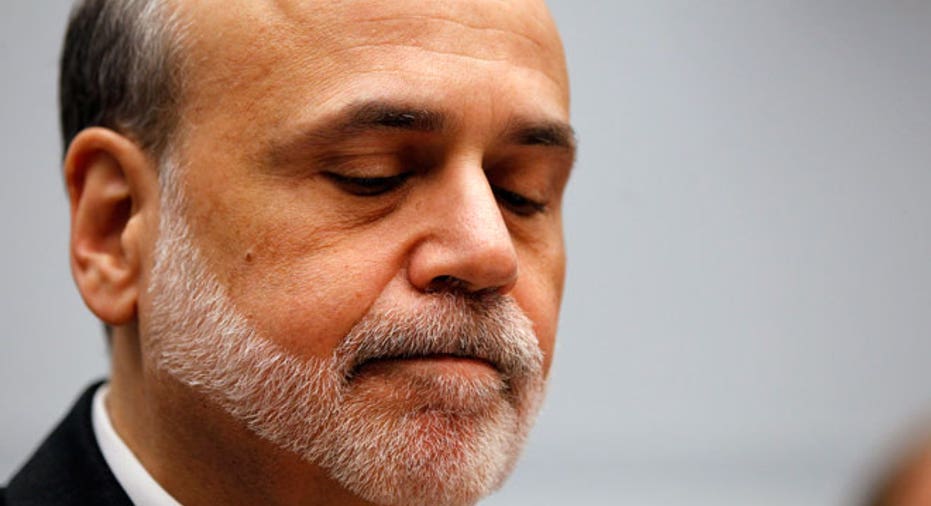CFOs to Bernanke: Don’t Bother With QE3

As Wall Street continues to bank on new easy-money policies from the Federal Reserve, new signs are emerging that a third round of quantitative easing would fail to persuade corporate America to open its vast coffers.
According to a report released this week by Duke University, the overwhelming majority of chief financial officers surveyed said a meaningful reduction in already ridiculously low interest rates -- the primary goal behind more QE -- wouldn’t cause their capital spending plans to budge.
“The survey paints a stark picture. In current circumstances, lower interest rates will not spur investment. The potential QE3 is doomed,” said Cam Harvey, a finance professor at Duke.
The poll comes just before the conclusion of a highly-anticipated Fed summit that market participants believe will lead the central bank to pump more easy-money juice into the financial system.
But there is a near consensus, including from inside the Fed, that a third bond-buying program or a different form of easing won’t be as effective at stimulating the economy as the prior two iterations.
Duke’s Global Business Outlook survey goes a step further, showing that further QE won’t move the needle almost at all in terms of capital spending. That is a crucial finding considering the Fed said U.S. nonfinancial corporations held a whopping $1.74 trillion in cash or liquid assets on their balance sheets as of the end of the first quarter.
“Rates have been pushed so low by such highly accommodative Fed policy that we’ve reached a point where sectors of the economy that usually respond to low rates are no longer sensitive,” said David Jones, president of DMJ Advisors and a former Fed economist.
How Low Can They Go?
The report showed that 91% of the 1,500 CFOs polled wouldn’t bolster their spending plans even if the Fed’s programs successfully lowered interest rates by one percentage point. And 84% said a hefty two-point reduction in rates wouldn’t change their spending plans either.
“Rates are already at historic lows, so lower rates would not impact our decision,” one survey respondent said.
Another CFO said, “We need to see reliable growth before we are willing to invest any further.”
At the same time, higher rates wouldn’t seem to alter the capital spending picture much, either.
Just 14% of respondents said a one percentage point increase in interest rates would cause them to delay or cancel their investments.
“CFOs are saying that simply focusing on interest rates is misguided. In this environment of 50-year interest rate lows, a lower rate makes no measurable difference,” Harvey said.
‘Running Out of Ammo’
Interest rate fluctuations are the primary way that central bankers impact the economy, raising them when inflation is a risk and lowering them to encourage growth and maximum employment.
But the Fed has already slashed rates unprecedentedly low and promised to keep them low through the end of 2014, removing the central bank’s main policy tool.
It also deployed a series of nonconventional tools, highlighted by a pair of QE programs that lowered rates by consuming almost $2 trillion of bonds.
“We know the Fed is running out of ammo. They are getting into diminishing returns,” said Jones.
Still, with the lackluster economic recovery and unemployment at 8.1%, the Fed is “virtually certain to ease monetary policy” this week, Jan Hatzius, chief U.S. economist at Goldman Sachs (NYSE:GS), wrote in a note this week.
Federal Policies in Focus
Besides underscoring the lack of tools at the Fed’s disposal, the Duke survey highlights deep political concerns caused by the November elections and especially the looming fiscal cliff.
“It's not high interest rates that are holding us back, but uncertainty about federal policies and loss of financial wealth of our customers,” one CFO told the researchers.
Due to those jitters, executives now plan to boost capital spending by just 3.7% over the coming 12 months, down from 4.9% last quarter and 7.3% in the spring, the Duke report said. Hiring is seen rising just 1.5%, down from more than 2% previously.
The Congressional Budget Office has warned that the U.S. could sink into a recession and two million jobs could be lost if Congress is unable to avoid the fiscal cliff, which would cause about $500 billion in expiring tax cuts and automatic spending reductions in 2013.
“What the CFOs are saying loud and clear, in my view, is that Washington is the problem -- and the Fed can’t fix that,” said Jones.



















